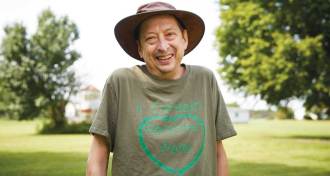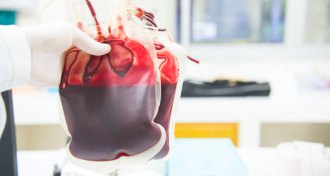Health & Medicine
-
 Health & Medicine
Health & MedicineAn eye disorder may have given Leonardo da Vinci an artistic edge
An analysis of portraits believed to portray Leonardo da Vinci offers evidence that the artist had exotropia, in which one eye turns outward.
-
 Life
LifeHow to make organ transplants last
New strategies aim to help transplant recipients keep their organs healthy with fewer (or no) immune suppressing drugs.
-
 Health & Medicine
Health & MedicineNew therapies pack a triple-drug punch to treat cystic fibrosis
In testing, a triple-drug therapy significantly improved lung function in cystic fibrosis patients with the most common disease-causing mutation.
-
 Health & Medicine
Health & Medicine50 years ago, the safety of artificial sweeteners was fiercely debated
Scientists are still learning more about the health effects of chemical sweeteners
-
 Artificial Intelligence
Artificial IntelligenceArtificial intelligence crowdsources data to speed up drug discovery
A new AI that judges whether drugs will interact with certain proteins can train on data from multiple sources while keeping that info secret.
-
 Astronomy
AstronomyReaders wonder about a hydrogen wall, pig lung transplants and more
Readers had questions about a glow at the edge of the solar system, pig lung transplants, the use of the word promiscuous and more.
-
 Health & Medicine
Health & MedicineA mysterious polio-like disease has sickened as many as 127 people in the U.S.
Medical experts are trying to trace the cause of 62 confirmed cases of acute flaccid myelitis this year.
-
 Life
LifeExplore the history of blood from vampires to the ‘Menstrual Man’
Rose George’s book ‘Nine Pints’ offers readers an engaging and insightful cultural and scientific history of blood.
-
 Health & Medicine
Health & MedicineHundreds of dietary supplements are tainted with potentially harmful drugs
Most dietary supplements tainted with pharmaceutical drugs were marketed for sexual enhancement, weight loss or muscle building.
-
 Health & Medicine
Health & MedicineNearly 2 million U.S. adult nonsmokers vape
A new study finds that an estimated 1.9 million U.S. adult nonsmokers use e-cigarettes, highlighting worries that the devices are addictive.
-
 Health & Medicine
Health & Medicine‘Sawbones’ invites readers to laugh at the bizarre history of medicine
‘The Sawbones Book,’ based on the popular podcast by Dr. Sydnee and Justin McElroy, ties the strange history of modern medicine to modern pseudoscience.
By Mike Denison -
 Health & Medicine
Health & MedicineCity size and structure may influence influenza epidemics
The size and structure of cities helps shape the progression of new influenza cases during a flu season, a new study finds.